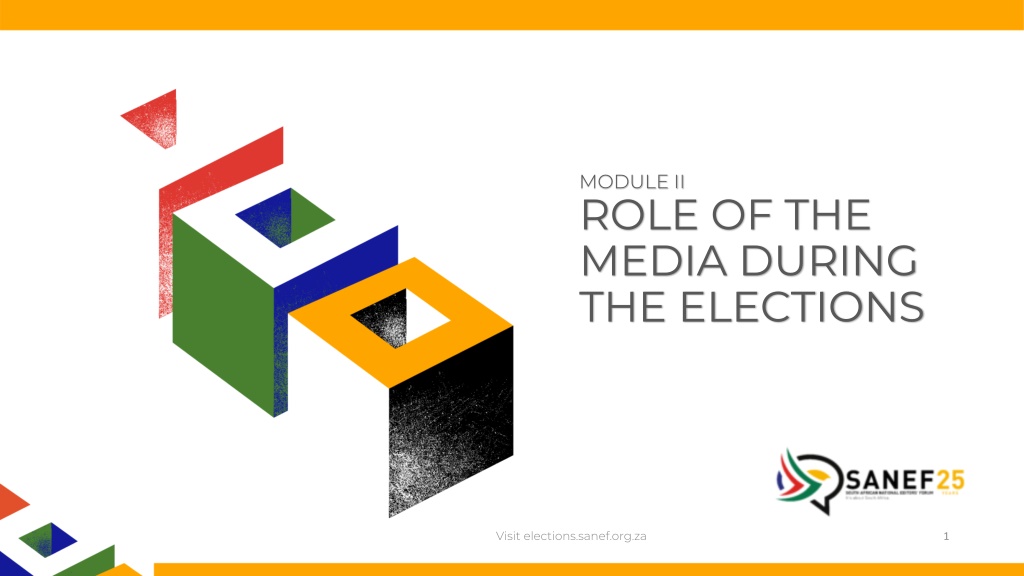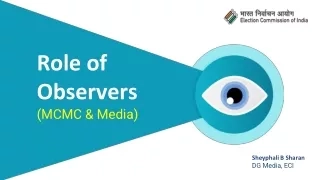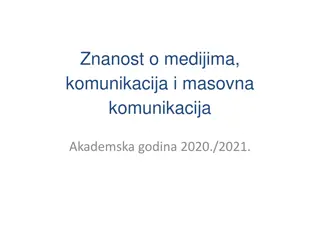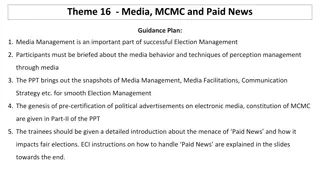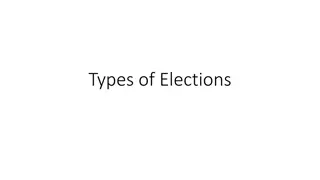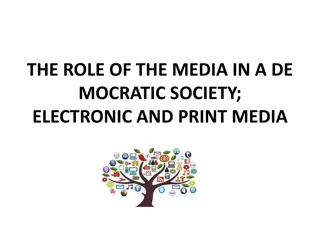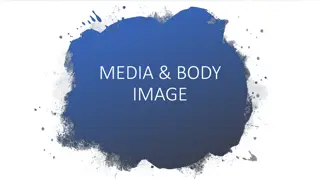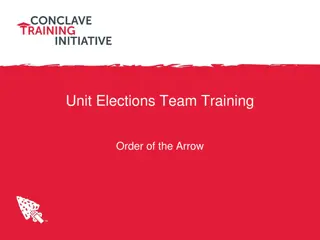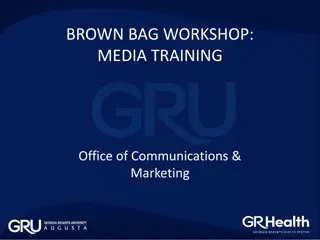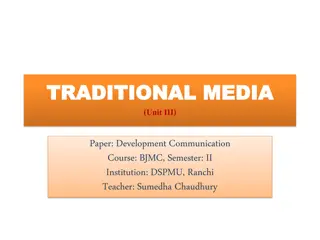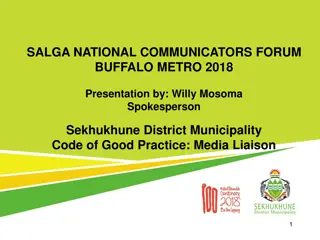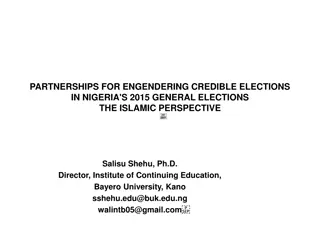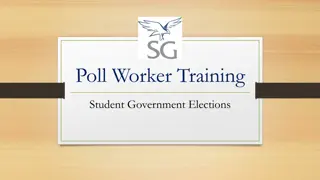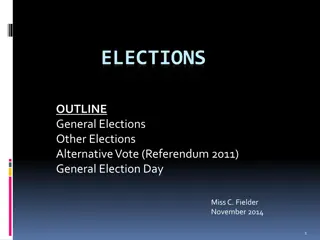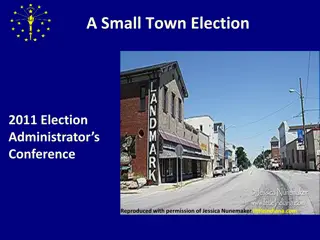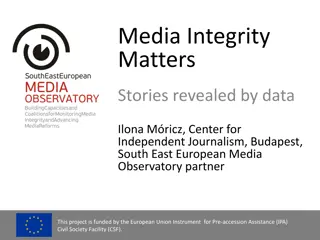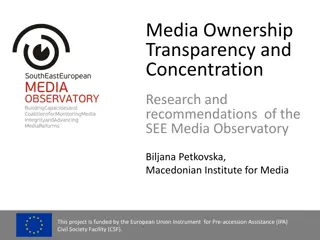Media's Role in Elections: Regulations and Best Practices
The role of media during elections is crucial, governed by international treaties protecting freedom of expression. South African media's adherence to guidelines, laws, and policies is essential for fair election coverage. The Print Code of Ethics, regulatory frameworks, and internal processes are key factors to consider. The use of social media and best practices for election coverage are also discussed.
Download Presentation

Please find below an Image/Link to download the presentation.
The content on the website is provided AS IS for your information and personal use only. It may not be sold, licensed, or shared on other websites without obtaining consent from the author. Download presentation by click this link. If you encounter any issues during the download, it is possible that the publisher has removed the file from their server.
E N D
Presentation Transcript
MODULE II ROLE OF THE MEDIA DURING THE ELECTIONS Visit elections.sanef.org.za 1
International law framework International treaties on freedom of expression and political rights: International treaties on freedom of expression and political rights: Articles 19 and 25 of the International Covenant on Civil and Political Rights. Articles 9 and 13 of the African Charter on Human and Peoples Rights. Article 27(8) of the African Charter on Democracy, Elections and Governance. Declarations and guidelines on freedom of expression and access to information: Declarations and guidelines on freedom of expression and access to information: Declaration of Windhoek on Promoting an Independent and Pluralistic African Press. African Charter of Broadcasting. Declaration of Principles on Freedom and Expression in Africa. Guidelines on Access to Information and Elections in Africa (ACHPR Guidelines). QUESTION FOR DISCUSSION: QUESTION FOR DISCUSSION: The ACHPR Guidelines set out a list of information that print, broadcast, and online media, both publicly and privately owned, should proactively disclose. This includes, for example, editorial and ethical codes or guidelines; criteria and allocation of airtime or news coverage for political campaign advertisements and activities; and a plan for a transparent repository of all political advertisements. How do you think South African media is doing in meeting these guidelines? Visit elections.sanef.org.za 2
Group exercise Divide into groups and discuss the following questions: What laws and policies are you aware of that apply to your newsroom relating to election coverage? What internal processes do you follow within your newsroom relating to election coverage? What is the approach within your newsroom regarding the use of social media (particularly personal social media accounts) relating to election coverage? Thereafter, collectively discuss what policies and processes would be considered good practice for organisations and individuals covering the elections to adopt. Visit elections.sanef.org.za 3
Print and online media Regulatory framework Regulatory framework Overview Overview Press Code of Ethics and Conduct for South African Print and Online Press Code of Ethics and Conduct for South African Print and Online Media (Press Code) Media (Press Code) (updated in January 2020) Applicable to print and online media print and online media. Sets out the standard expected the standard expected of the print and online media, including for news gathering and reporting. Complaints against the media are dealt with in terms of the Complaints Procedures Complaints Procedures. Press Ombud empowered to issue sanctions publication that is voluntarily subject to such jurisdiction. sanctions against any Section 74 of the Municipal Electoral Act Section 74 of the Municipal Electoral Act Places specific controls on printed election media specific controls on printed election media during the election period. Any billboard, placard, poster or pamphlet intending to have an effect on the outcome of the election effect on the outcome of the election must clearly state the full name and address full name and address of the printer and publisher. Publisher of any publication must put a heading on articles saying advertisement saying advertisement if an article is paid for and comes from a registered party, its members or supporters, or a party list candidate. a heading on articles Visit elections.sanef.org.za 4
Broadcast media Regulatory framework Regulatory framework Overview Overview Broadcasting Act 4 of 1999 Broadcasting Act 4 of 1999 Objects include to establish and develop a broadcasting policy in the public interest public interest; to safeguard, enrich and strengthen the cultural, political, social and economic fabric social and economic fabric of South Africa; to ensure plurality views and information. Provides for the incorporation of the SABC incorporation of the SABC and for the Charter of the SABC. a broadcasting policy in the the cultural, political, plurality of news, Independent Communications Authority of South Africa Independent Communications Authority of South Africa Act 13 of 2000 Act 13 of 2000 Establishes ICASA as a juristic person that is independent to the Constitution and the law. ICASA must be impartial impartial, perform its functions without fear, favour or prejudice prejudice, and which must function without any political or commercial influence influence. Regulates broadcasting and telecommunications. independent and subject only fear, favour or without any political or commercial Electronic Communications Act 36 of 2005 Electronic Communications Act 36 of 2005 Aims include to promote convergence promote convergence and set up a legal framework for bringing together the broadcasting, broadcasting signal distribution and telecommunications sectors. Media coverage during the elections covered in sections 57 sections 57- -59 59. Visit elections.sanef.org.za 5
Broadcast media Regulatory framework Regulatory framework Overview Overview Regulations on Party Election Broadcasts, Political Regulations on Party Election Broadcasts, Political Advertising, the Equitable Treatment of Political Parties Advertising, the Equitable Treatment of Political Parties by Broadcasting Licensees and Related Matters by Broadcasting Licensees and Related Matters (Municipal Election Broadcasting Regulations) Apply Apply: (i) during an election period; (ii) to broadcasting service licensees; and (iii) to political parties contesting the national and provincial elections. Provides a more detailed framework more detailed framework Regulation 4(1) sets out principles of fairness principles of fairness in election coverage. ICASA recently published new draft draft Municipal Elections Broadcasting Municipal Elections Broadcasting Regulations, 2020 Regulations, 2020, which are open for public consultation Code of Conduct for Broadcasting Services Code of Conduct for Broadcasting Services (Broadcasting Code) Sets out the standards will be monitored by ICASA monitored by ICASA. Licensees that fall under the jurisdiction of the BCCSA follow the Code of the BCCSA. standards according to which broadcasting service licenses jurisdiction of the BCCSA are also required to Community Radio Election Guidelines Community Radio Election Guidelines Developed by the National Community Radio Forum National Community Radio Forum in 1999. Aimed specifically at assisting community radio stations to entrench their role role. Community media organisations still required to comply with all applicable broadcast and electoral laws and regulations applicable broadcast and electoral laws and regulations that affect elections. to entrench their all Visit elections.sanef.org.za 6
Broadcast media Electronic Communications Act: Political advertising Electronic Communications Act: Political advertising on broadcasting services on broadcasting services Electronic Communications Act: Party Election Electronic Communications Act: Party Election Broadcasts (PEBs) Broadcasts (PEBs) A broadcasting service licensee is not required to broadcast a political advertisement; but if they elect to, must afford all other political parties a similar opportunity. other political parties a similar opportunity. A licensee may broadcast a political advertisement only during an election period during an election period. No political advertisement may be broadcast later than 48 hours prior hours prior to the commencement of the polling period. No broadcasting service licensee may discriminate any political party. A public broadcasting service licensee must permit a PEB only during an election broadcast period only during an election broadcast period, and only if the broadcast is produced on behalf of a political party. ICASA must determine the time to be made available to political parties for this purpose. No PEB may be broadcast later than 48 hours prior No PEB may be broadcast later than 48 hours prior to the commencement of the polling period. Commercial or community media licensees are not required to broadcast PEBs, but must comply with section 57 if they elect to do so. must afford all only later than 48 may discriminate against Visit elections.sanef.org.za 7
Broadcast media Regulations on Party Election Broadcasts, the Regulations on Party Election Broadcasts, the Equitable Treatment of Political Parties by Equitable Treatment of Political Parties by Broadcasting Licensees and Related Matters, 2014 Broadcasting Licensees and Related Matters, 2014 Electronic Communications Act: Equitable treatment Electronic Communications Act: Equitable treatment of political parties by broadcasting service licensees of political parties by broadcasting service licensees Regulation 3, Equitable treatment: Each broadcasting service licensee will be expected to treat parties fairly, and should be consistent in its treatment of contesting parties and of conflicting views. Can be achieved over a series of programmes. A broadcasting services licensee must afford reasonable opportunities for the discussion opportunities for the discussion of conflicting views and must treat all political parties equitably. Political parties must be afforded a reasonable opportunity to respond if criticised respond if criticised particularly important during the 48 hours before commencement of polling or during polling. Opportunity to respond can either be in the same programme or as soon as reasonably practicable. Not applicable to PEBs or political advertisements dealt with in sections 57-58. reasonable reasonable opportunity to Regulation 4(1), Principles of fairness in election coverage: All news coverage should be fair to all interests concerned, and all parties should receive equitable treatment on current affairs programmes. Opportunity for conflicting views to be heard should not be interpreted as a requirement that all parties be heard on any subject, only that all views be heard. QUESTION FOR DISCUSSION: QUESTION FOR DISCUSSION: What processes are in place in your newsroom to ensure equitable treatment and fairness? Visit elections.sanef.org.za 8
Broadcast media - complaints ICASA: ICASA: ICASA consists of monitoring officers and complaints officers monitoring officers and complaints officers. The Complaints and Compliance Committee Complaints and Compliance Committee (CCC) is a seven-person committee empowered to decide on complaints from the public about broadcasters not following licence conditions. CCC makes recommendations to the ICASA Council recommendations to the ICASA Council on action to be taken against broadcasters. For election broadcasts, any person aggrieved by a PEB or political advertisement may lodge a complaint with ICASA within 48 hours after the broadcast after the broadcast. 48 hours BCCSA: BCCSA: Section 14 of the of the BCCSA s The BCCSA does not have jurisdiction in these matters and complaints must be directed to the Complaints and Compliance The BCCSA does not have jurisdiction in these matters and complaints must be directed to the Complaints and Compliance Committee of the Independent Communications Authority of South Africa Committee of the Independent Communications Authority of South Africa. The BCCSA s Code of Conduct for Subscription Broadcasting Service Licensees does not contain an equivalent provision. BCCSA s Free-to-Air Code of Conduct for Broadcasting Service Licensees : QUESTION FOR DISCUSSION: QUESTION FOR DISCUSSION: Identify the key differences in the regulatory approach to print, online and broadcast media, and discuss your views on the implications of this. Visit elections.sanef.org.za 9
FAQs for election coverage Do I need accreditation accreditation for voting or counting stations? NO Is the presiding officer obliged to grant me access obliged to grant me access to a voting station? NO Do I need accreditation for access to the Results Operation Centres Results Operation Centres? YES Who am I allowed to interview interview at the voting station? Only the PRESIDING OFFICER Are there any visuals that visuals that are not permitted? YES Am I entitled to have access to the results slips results slips? Not specifically, but it is posted on the door Can I report on opinion polls opinion polls? YES Can I report on exit polls exit polls? NO What role do observers observers play? Visit elections.sanef.org.za 10
Group exercise As indicated earlier, no political advertisements may be broadcast within 48 hours prior to the election. a) What are you and your newsroom doing to ensure that your media platforms comply with this regulation? b) How do you plan to create content that aligns with the spirit of the regulation, which is to give voters an opportunity to reflect on their voting choices? c) How do you plan to treat political stunts and the advantage of the political incumbent? QUESTION FOR DISCUSSION: QUESTION FOR DISCUSSION: Discuss these questions and share any tips, advice and strategies that might be useful for other journalists during election coverage. Visit elections.sanef.org.za 11
FURTHER READING Visit elections.sanef.org.za 12
Suggested resources ARTICLE 19, Acting on UN Human Rights Council Resolution 33/2 on the Safety of Journalists (2017) (accessible here). C. Silverman, Verification handbook: The ultimate guideline on digital age sourcing for emergency coverage , (undated) (accessible here). CPJ, Safety kit for journalists covering the South African election, (2019) (accessible here). IEC, Municipal elections handbook , (2016) (accessible here). Media Monitoring Africa, Disinformation and fake news during elections: Proposals for the upcoming 2019 General Elections in South Africa (2018). Press Council, Code of Conduct and Ethics for the South African Print and Online Media: Decoding the Code sentence by sentence , (1 January 2019) (accessible here). Press Council, Guidance notes: A brief for journalists covering the elections , (February 2019) (accessible here). UNESCO, Journalism, fake news and disinformation : Handbook for journalism education and training , (2018) (accessible here). Dullah Omar Institute, Electing Councillors: A Guide to Municipal Elections, (2016) (accessible here). Municipalities.co.za, The Local Government Handbook South Africa 2021, p 15 (accessible here). South African Cities Network, State of City Finances 2020, (2020) (accessible here). For more information and resources, please visit: For more information and resources, please visit: https://elections.sanef.org.za https://elections.sanef.org.za. . Visit elections.sanef.org.za 13
